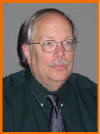 Ernest Charles Bernard
Ernest Charles Bernard
Dr. Bernard is perhaps best known for his research on nematode diversity. His work in this area is both driven and fueled by his exceptional talent as a systematist and his keen interest in biology, especially invertebrate zoology. Dr. Bernard is an unrepentant taxonomist, and his taxonomic work with nematodes from locations as disparate as the Aleutian Islands, Hawaii, and the Appalachian mountains places him among the leaders in nematode systematics. His 105 publications cover a staggering array of topics and disciplines. In addition to his publications on basic ecology, surveys and systematics, Dr. Bernard’s record includes diverse contributions to applied agriculture including work on potential biocontrol agents, host resistance, crop rotation, nematicides, as well as a broad range of outreach publications for nonspecialists including homeowners. His taxonomic work has covered species descriptions of little known nematode taxa as well as Collembola, Protura, and fungi (Entomophthorales). In addition, he is internationally recognized for his research on the interaction among plant-parasitic nematodes, tall fescue, and a fungal endophyte of tall fescue.
In his current research, Dr. Bernard continues his penchant for diversity by working on projects that range from systematic studies coupled to a US Geological Survey-funded All Taxa Biodiversity Inventory to assays of plant parasite reproductive capacity in agricultural systems. His work as a member of the University of Tennessee’s Bioactive Natural Products Center of Excellence has been very directly related to development of control technology, yet his work on the microbial community in the millipede intestine may have far-reaching impacts in basic biology. He has stretched his interests in biological control of plant pests to a leadership role in combating the progress of the Hemlock Woolly Aphid, which threatens the hemlocks of the Great Smoky Mountains National Park and associated ecosystems of the southern Appalachians with total destruction.
Dr. Bernard is an excellent teacher. He received recognition for his achievements in the form of an Award of Merit from the National Association for Colleges and Teachers of Agriculture. He teaches a number of graduate courses in nematology and entomology. In addition to teaching his own courses, he is constantly asked to participate in other courses, often giving 10 or more lectures in other courses each semester. He is also an accomplished photographer and selflessly extends his knowledge to others both inside and outside his home institution.
Dr. Bernard has an extraordinary record of commitment to service as well. He is on the Board of Directors of Discover Life in America, and has been a member or chair of numerous regional and University committees, including Chair of the College of Agricultural Sciences and Natural Resources Graduate Academic Council. Perhaps most importantly to nematologists, Dr. Bernard has demonstrated his commitment to service in our own Society. He chaired the Local Arrangements Committee for our 1982 Annual Meeting in conjunction with the World’s Fair in Knoxville, Tennessee. After serving on the Ecology and Biological Control standing committees, Dr. Bernard entered a lengthy term as editor, first of the Nematology Newsletter and then on the editorial board of the Journal of Nematology and more recently as Editor and Chief of the Journal. Finally, but certainly not least in terms of his contributions to the Society, he has served as Vice President, President-Elect, President, and Past-President.
The Society of Nematologists awarded Dr. Ernest Bernard the title of Fellow of the Society in 2005.